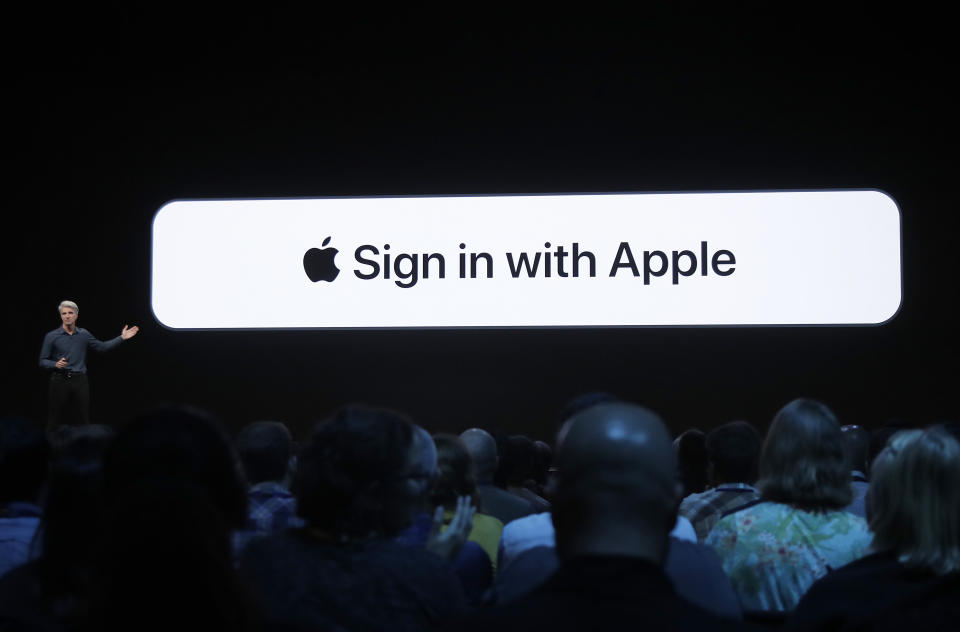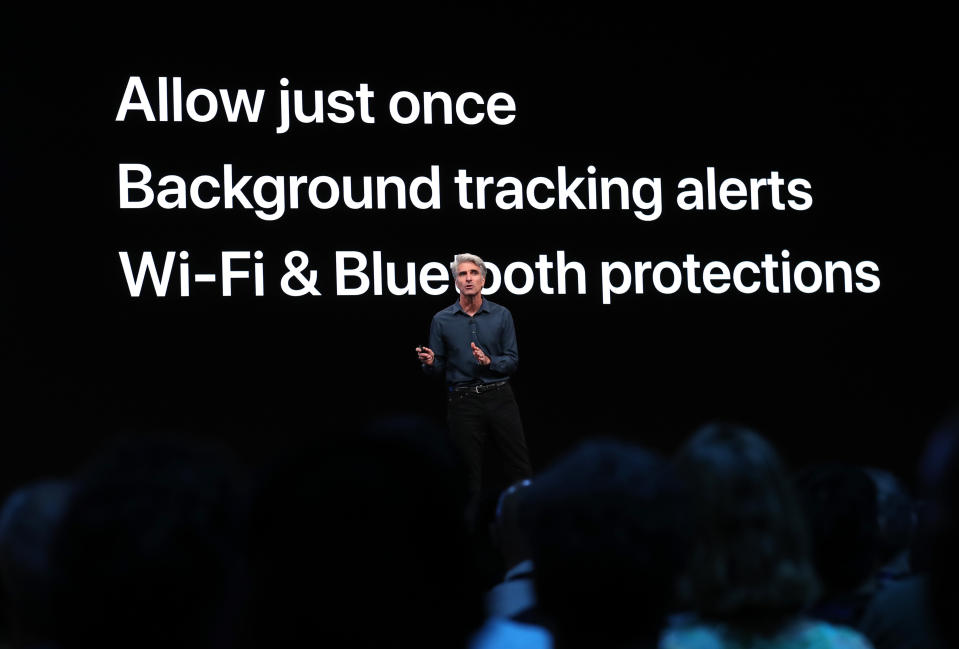Apple's most important product isn't the iPhone anymore
At its Worldwide Developers Conference on Monday, Apple (AAPL) unveiled a slew of new software features ranging from its iOS 13 to an operating system dedicated to the iPad to improvements to the Apple Watch and Mac. But the common thread linking all of those products together, and something Apple is pushing harder than any single offering, is privacy.
From Maps not tracking your location data and Siri keeping your voice searches on the device, to security camera feeds remaining private and a new sign-in method for websites, Apple is banking on privacy as a key differentiator for consumers who are tired of their data being collected, leaked, or stolen.
"It seems like a never-ending job," Apple VP of product marketing for iOS, iPad, iPhone, Greg Joswiak, told Yahoo Finance.
"I think we've done more by far than any others in building privacy. But our job's not done. We still have more and more to do to protect your information and give you the control over what information you want to release to people."
All in on privacy
Apple has been pushing privacy as a major product feature for some time now. CEO Tim Cook has specifically called out privacy as a major issue his company is dedicated to tackling, and lamented the use of user data as an advertising tool for companies like Facebook (FB) and Google (GOOG, GOOGL).
Facebook CEO Mark Zuckerberg and Google CEO Sundar Pichai, for their part, have pushed back against such assertions, with Zuckerberg calling Cook's criticisms "extremely glib and not at all aligned with the truth" and Pichai saying privacy should not be a luxury good.
But with reports of information collection and data leaks seemingly hitting the news every day, Apple made sure to hammer home its stance on data collection and use.
"People oftentimes have no idea the kind of information they are exposing to people, and they certainly don't have the control over not providing it," Joswiak told Yahoo Finance. "We are of the mind to provide you with both of those."

Apple's biggest privacy announcement, and perhaps its hardest swipe at Facebook and Google, came in the form of a new feature called Sign in with Apple. An alternative to sign in features for apps and websites offered by Google and Facebook that let you connect via your Google or Facebook log-in information, Sign in with Apple promises that it doesn't collect or share any of your sign in data for sale to third-parties.
The feature works by letting you sign in to services and websites using your Apple ID credentials. Apple then gives you the option of using your actual email address tied to your Apple ID, or instead, using a fake address that ties back to your Apple ID. With the fake address, websites that you log into won't be able to track your private data. Google and Facebook won't have access either, since you're not using their products to log in.
With Sign in with Apple, the company acts as an intermediary for your communication with the site or app you're logging into. When you enter your Apple ID information, it sends a signal to Apple that you want to use your fake email account. It then sends that email account information to the site or app and logs you in. As a result, none of your personal data goes to the site or app.
"Today developers really if they want to enable a quick, one-tap sign in for their apps, really are forced to use one of the social networking sign in buttons, and what that actually does is exposes a lot of personal information from their customers to these social networks in a way that can allow them to be tracked and expose information they don't oftentimes even know they're exposing just by tapping that button," Joswiak said.
"So we wanted to offer and alternative that would allow people a more private way to do a quick authentication to an app."
Privacy as product
It's not just Sign in with Apple that allowed the tech giant to highlight its privacy chops at WWDC. The company also said that it will now allow you to choose how third-party apps access your location data. The update will let you give such apps one-time access, so they don't track your location in the background when not in use, or let you give them unfettered access to your location.
Apple, however, will send you regular updates indicating that the apps are checking in on your location. You can also, of course, choose to simply keep apps from accessing your location information at all.
The company is also putting a stop to a workaround that third-party apps used to access your location data even if it was turned off by exploiting nearby Wi-Fi and Bluetooth signals.

Currently, apps can triangulate your location by looking at those signals, giving them a fairly accurate understanding of where you are. Blocking that will mean that apps will have a much harder time finding you if you want to keep your location data private.
Apple further explained how Siri, which is getting a major voice upgrade to make it sound more human, doesn't save and voice search information outside of your personal device. That's in contrast to services like Amazon's (AMZN) Alexa and Google’s Assistant, which save search data in their own cloud servers.
Seemingly every new announcement from Apple focused on privacy, with the company ensuring that each time it unveiled a new piece of software, it mentioned that user data was protected.
Apple doesn't traffic in user data as a means to sell ads like Google, Facebook, and increasingly Amazon. Its revenue is generated from hardware and software sales and subscriptions, so it doesn't need to deal in data.
But the company significantly stepped up its efforts in pointing to this distinction ever since the Cambridge Analytica scandal revealed that a political consulting firm misused the data of millions of Facebook users as part of an effort to elect of Donald Trump.
Since then, Apple's Cook has pushed security and privacy during interviews and speeches, and in January, the company plastered the side of a large building with an ad pointing to Apple's stance on keeping user data private. It's no coincidence that the ad was put up outside of the Consumer Electronic Show, where Google and Amazon were showing off new features for their voice assistants.
All of this comes against the backdrop of lawmakers looking at potential privacy legislation in 2019, and a renewed interest in antitrust action against big tech. Presidential hopefuls like Senator Elizabeth Warren (D-MA.), developer lawsuits, and a recent Supreme Court ruling ensure that while Apple is ahead of the game on privacy, it could get caught up in antitrust matters.
For now, however, Apple seems to have insulated itself from the troubles facing much of the tech industry. Now it will have to make that last.
More from Dan:
What is facial recognition technology and why is it so controversial
The country’s largest transit system will soon let you pay with your iPhone
Amazon shareholders vote to continue selling facial recognition tech to police
Email Daniel Howley at [email protected]; follow him on Twitter at @DanielHowley.
Follow Yahoo Finance on Twitter, Facebook, Instagram, Flipboard, SmartNews, LinkedIn,YouTube, and reddit.
